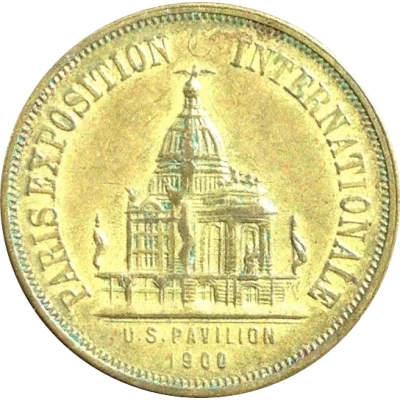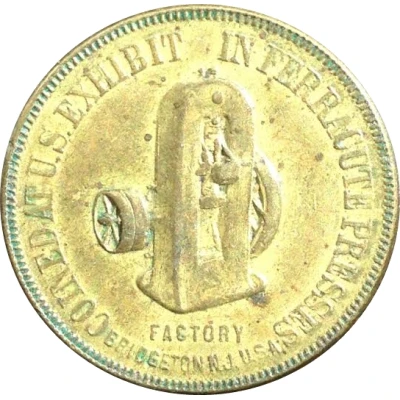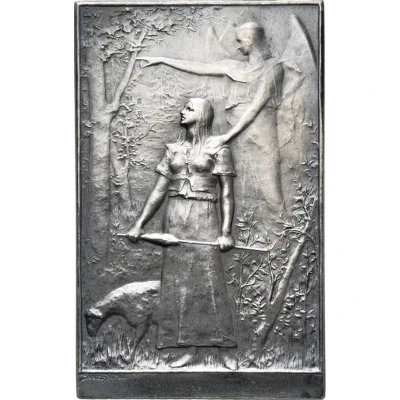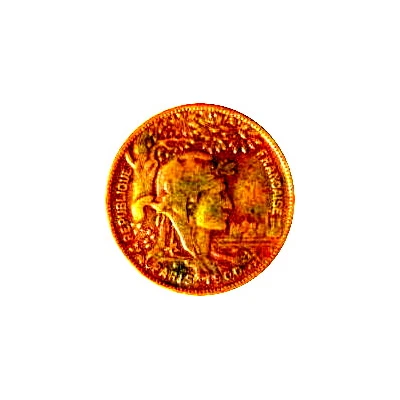
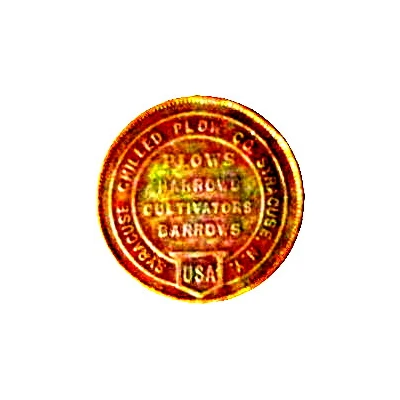

Token - Syracuse Chilled Plow Company
1900 year| Gold plated bronze | 8.8 g | 29 mm |
| Location | France |
|---|---|
| Type | Medals › Advertising medallions |
| Year | 1900 |
| Composition | Gold plated bronze |
| Weight | 8.8 g |
| Diameter | 29 mm |
| Thickness | 2 mm |
| Shape | Round |
| Technique | Milled |
| Orientation | Medal alignment ↑↑ |
| Demonetized | Yes |
| Updated | 2024-11-12 |
| Numista | N#67616 |
|---|---|
| Rarity index | 93% |
Reverse
Script: Latin
Lettering: SYRACUSE CHILLED PLOW CO. SYRACUSE, N.Y. / USA / PLOWS / HARROWS / CULTIVATORS / BARROWS
Comment
reportedly issued with a loop for suspensionSyracuse Chilled Plow Company was created in 1876. Their products won a gold medal at the Paris Exibition in 1900 and had this token made afterwards. They were bought out by John Deere in 1910.
The board of directors of Deere & Co., under the leadership of President William Butterworth, met on Jan. 6, 1910, and decided, among other things, to: “Find and bring into the orbit of the company several other agricultural machinery manufacturers ... which would then result in an organization closer to a ‘full line’ company.”
Among those other manufacturers was the Syracuse (N.Y.) Chilled Plow Co. Deere had been selling a chilled plow for several years, but it was an “exact imitation of the Oliver,” as S.H. Velie Sr. (John Deere’s son-in-law and senior manager of Deere & Co.) admitted, and it didn’t sell well. The chilled iron plows made by the Syracuse firm, however, were ideal for the loose, gravelly soil of the Eastern states and were quite popular. At the turn of the century, Syracuse was doing about $1.25 million worth of business per year and earning about 15 percent profit.
The history of the Syracuse Chilled Plow Co. goes way back. In 1620, the same year the Mayflower landed at Plymouth Rock, Robert Wiard was born in England. He married and, like so many of his countrymen looking for opportunity, came to the New World where he settled in Hartford County, Conn. He had a son and presumably farmed for a living, as most settlers did at the time.
Not much is known about the next two generations of the Wiard family, but they stayed put in Hartford County and, in 1769, Thomas Wiard was born. The record says he married in about 1796, was made a freeman in 1802, and in about 1805 moved to a farm near East Avon in Livingston County, N.Y.
Apparently Thomas Wiard was a tinkerer; he not only ran his farm but also found time to build wooden plows and experiment with cast iron construction. He fathered 12 children with two wives, and served as a justice of the peace and town supervisor.
Four of Thomas’ sons, William (born in 1798), Thomas (1805), Matthew (1813) and Henry (1815), became involved in manufacturing plows, and two very successful and well-known plow companies resulted. These plow companies were the Syracuse Chilled Plow Co. and the Wiard Plow Co., Batavia, N.Y. Since this story is about the Syracuse firm, we’ll forget about the other company for the time being.
The records are a little foggy on the details, but apparently Thomas’ third son, Matthew, developed a certain plow and sold a set of plow patterns to John S. Robinson, Canandaigua, N.Y., who seems to have moved to Syracuse where he established the Robinson Chilled Plow Co. in 1876. Another account says Harry Wiard, Thomas’ grandson, invented a process for chilling cast iron and that was the genesis of the Robinson firm. Although I can find no patents to back up the latter theory, it seems plausible, since Harry’s son, William Wolcott Wiard (who was born in 1865), was president of the Syracuse plow company when Deere bought the firm.
http://www.farmcollector.com/implements/syracuse-chilled-plow-deere-co
